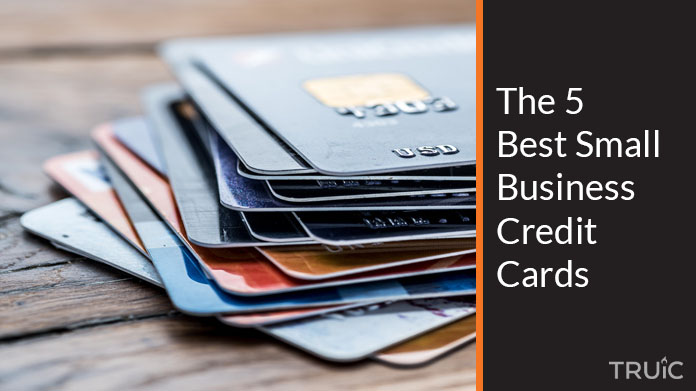The 5 Best Small Business Credit Cards of 2024
The best business credit cards of 2024 will save you money and give you new business credit.
Having the best small business credit card can give you the best rates and the fewest fees.
Our The 5 Best Small Business Credit Cards Of 2022 review will help you choose the best small business credit cards for your business.
#1 Recommended Small Business Credit Card: BILL Divvy Corporate Card

Best Business Credit Cards
Our Approach:
Choosing the best business credit card comes down to three things:
- Spending habits of your business
- Needs of your business
- Rewards and benefits you may want for your business
In this business credit card review, we’ll look at some of the top small business credit cards and share what makes them the right choice. We’ll explore rewards, perks, benefits, rates, annual fees, and more. By the time you finish reading this review, you’ll know which business credit card is best for you.
Our Top Business Credit Cards for 2024:
- BILL Divvy Corporate Card is the best overall card for small businesses.
- Brex is the best card for higher credit limits.
- Secured MasterCard from Capital One is the best card for building business credit because it carries all the power of regular MasterCard credit cards with no annual fee.
- Chase Ink Business Cash is the best card for purchasing office supplies because there is no annual fee, and you’ll get solid cash back at office supply stores and more.
- American Express Blue Business Plus is the best card to help finance your business because it charges no annual fee and allows maximum flexibility in redeeming rewards.
Best Overall Business Credit Card: BILL
The best overall business credit card is one that has easy credit approval, terms, sizable credit limits, a solid rewards program, no annual fee, and goes out of its way to help businesses establish and build a business credit. BILL Divvy Corporate Card is that card.
While no single card can fulfill the needs of every company, BILL approves every business that applies and offers a simple way for any business to earn cash on their day-to-day expenses.
BILL offers two types of credit cards: A credit builder card for new businesses. And a regular credit builder for businesses having established tradelines.
Ideal for: New businesses that need a business credit card without having to rely on the business owner’s personal credit score for approval.
With this card, you will never pay an annual fee, enjoy one of the highest rewards programs, and get guaranteed approval when you apply. You’ll also be able to track expenses, assign unlimited cards to your employees, set limits on those cards, and enjoy a sizable credit limit to help your business grow.
When you choose BILL, you’ll earn rewards for all your spending and get helpful expense management and accounting softwares.
REWARDS AND BENEFITS (TERMS APPLY)
- No annual fee
- Free ACH deposits
- Unlimited employee cards
- Free expense management and accounting software
- Earn rewards points on every purchase
- Divvy up your credit limit across your corporate cards
- Track expenses in Xero, QuickBooks, and other accounting software
- Build business credit quickly
- More rewards when you pay your bill in full weekly
FEES
- Track all business expenses
- Unlimited rewards program
- Send ACH and wires for free
- Automatic bill pay feature
- Free spend management software
Learn more about this card on the BILL website.
Best High-Limits Card: Brex Business Credit Card
To qualify for low-interest business loans your business needs larger lines of credit than what most Net-30 accounts provide. That’s where the high-limit Brex business credit card comes in handy. With Brex you get a fee-free card that has an enticing rewards program, plus a higher credit limit than what most other credit card companies will extend to new customers.
Ideal for: Businesses wanting to improve business credit scores to qualify for low-interest business loans faster.
Brex offers an attractive package of rewards and benefits that help you grow your business faster. It provides extremely flexible rules for redeeming points and no fees whatsoever.
REWARDS AND BENEFITS (TERMS APPLY)
- No fees
- Reward program
- Larger credit limits
- Reports to major business credit bureaus
- Free spend management software
FEES
- No fees
Learn more about this card on the Brex website.
Best Card for Building Business Credit: Secured MasterCard from Capital One
Having good business credit is essential if you want your business to succeed. Not only will having good credit and a high line of credit help you get loans and financing for bigger expenses, but it will also be helpful in the event of unforeseen expenses.
If you need to improve your business credit or establish your credit history, finding the right card is essential.

This personal credit card is a great place to start for business owners who have poor (or no) credit history and lack the cash to make a sizeable security deposit.
This card carries all the power of regular MasterCard credit cards (e.g., roadside assistance, travel accident insurance) with no annual fee. Since this isn’t a business credit card, you’ll have to manually separate your business and personal expenses.
REWARDS AND BENEFITS (TERMS APPLY)
- Access to a higher credit line as long as you make your first five monthly payments on time.
- Pick your due date and method of payment (e.g. check, online, or local branch).
$0 fraud liability. - Free authorized users.
FEES
- No annual fee.
- A required security deposit of $49, $99, or $200.
- No balance transfer fee.
- No foreign transaction fee.
- 3% or $10 cash advance fee (whichever is greater per transaction).
Learn more about this card on the Capital One website.
Or
See more cards that can help you build your personal and business credit.
Best Card for Purchasing Office Supplies: Chase Ink Business Cash
If you want to be rewarded for spending money on things that are necessary to keep your business running smoothly, a credit card that offers rewards on a host of business expenses is a great option.
Chase Ink Business Cash does just that. This card not only provides cashback rewards on office supplies, but it also offers rewards for purchases like gas for travel to and from work, business outings to restaurants, and the internet, cable, and phone services for your business.

This is an excellent choice for any business looking to earn rewards on regular purchases. The card offers 5% cash back, with a limit of $25,000 each membership year, on just about everything a business needs, including office supplies, internet, cable, phone services, and more.
You can redeem earnings for cash back, travel, gift cards, and other rewards through Chase Ultimate Rewards. You can even shop on Amazon using your points. See below for more information on rates, fees, and perks.
REWARDS AND BENEFITS (TERMS APPLY)
- $750 bonus cash back after spending $7,500 on eligible purchases in the first three months after opening an account.
- 0% introductory APR on purchases for the first 12 months.
- 5% cash back on purchases at office supply stores and on internet, cable, and phone services up to $25,000 each account anniversary year, then 1% afterward.
- 2% cash back at gas stations and restaurants up to $25,000 per year, then 1%.
- Unlimited 1% cash back on all other purchases.
- Employee cards at no additional charge.
FEES
- No annual fee.
- 3% foreign transaction fee.
- 5% or $5 balance transfer fee (whichever is greater per transaction).
- 5% or $15 cash advance fee (whichever is greater per transaction).
Learn more about this card on the Chase website.
Best Card to Help Finance Your Business: American Express Blue Business Plus
As a new business owner, you’ll need a simple business credit card with predictable and useful rewards. American Express Blue Business Plus is the best of these simple credit cards. With 0% APR for the first year, you don’t have to worry if your cash flow isn’t completely predictable. You’ll also be earning rewards on all the things you need to help your business grow.

This card’s 0% intro APR offers lasts 12 months. That makes it an ideal card for brand-new businesses and those whose cash flow is temporarily unpredictable.
This card also offers an unlimited 2 points per $1 spent on business purchases along with 2 points per dollar on every purchase up to $50,000. This is an excellent benefit for new businesses that will need to make a wide range of purchases that may not fit neatly into the business category.
Finally, this program also offers members the benefit of applying for pre-approved loans up to $25,000.
The only drawback to this card is it’s 2.7% foreign transaction fee. If your business will routinely work overseas, this is not the card for you. See below to learn more about the card’s rates, fees, and perks.
REWARDS AND BENEFITS (TERMS APPLY)
- 0% intro APR for 12 months.
- 2x points per dollar spent on the first $50,000 for every calendar year.
- 2x points on business purchases like office supplies and client dinners.
- 1x point per dollar spent after that.
- Spend Manager: American Express mobile app. Helps add receipts and notes to transactions.
- Get up to 99 employee cards for free.
- Spend beyond your credit limit.
- Exclusive access to ticket pre-sales and cardmember only events in your city.
- Complimentary ShopRunner membership: Provides two-day shipping at participating retailers.
- American Express personal loans: Apply for a pre-approved loan of $3,500 to $25,000.
- Access to Quickbooks to label and transfer your transaction data from American Express.
FEES
- No annual fee.
- No cash advance fee.
- 3% or $5 balance transfer fee (whichever is greater per transaction).
- 2.7% foreign transaction fee.
Learn more about this card on the American Express website.
Small Business Credit Cards Summary
While it’s important to get a business credit card, it is even more important to get one that fits the needs of your business. Knowing what type of rewards will help you run your business most effectively will allow you to make the right steps toward success as a business owner.
If you know that you are looking for specific rewards and perks, like airline miles or rewards for office expenses, you can get a card like the Capital One Spark Miles for Business card or the Chase Ink Business Cash card, respectively.
However, if you don’t have a specific type of reward in mind, it is never a bad option to choose a card like the Capital One Spark Cash for Business card, which offers great cashback rewards that can be used any way that you see fit. Before applying for any card, be sure you understand the needs of your business and the rewards and fees included. This will help you get the most out of your business credit card.
We hope that this guide has been useful in helping you select which business credit card is best for you. However, if you need more help in deciding which type of card will best suit your business, or if you want to explore more credit card options, we offer several guides below to help you make a more informed decision.
Small Business Credit Cards FAQ
What are the benefits of having a business credit card?
It’s important to have a small business credit card to keep your personal and business finances separate. It can also help you to build business credit and gain various rewards. Read more about why you should get a business credit card.
What is the best credit card for a small business?
We chose Capital One Spark Cash for Business as the best overall credit card for small businesses. Read the full review.
What should a small business look for in a business credit card?
There are many factors to consider when choosing a small business credit card, such as fees, rates, rewards/benefits, etc.
Looking for Something Different?
If you’re still not sure where to start, our How to Choose a Small Business Credit Card guide covers all the basics you’ll need to start your search. It includes everything you’ll need to know about rewards, card fees, interest rates, and more.
If you already have a specific reward program in mind, our lists of small business credit cards can direct you to the best option within any given reward category. We cover cards based on their benefits and features, like the best cards for purchasing advertising, those with no annual fees, cards offering premium travel benefits, and much more.


